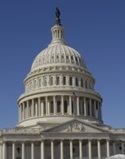
As of February 14, it was reported that the President plans to sign the spending bill that will keep the U.S. Government open.
Looking to the next budget cycle, the process for developing funding bills for FY 2020 are in the early stages. While the President typically submits a budget request to Congress by the first Monday in February, lawmakers expect the Trump Administration to send a high-level summary (or “skinny-budget”) of its FY 2020 budget request March 11, and a full budget March 18. Hearings conducted by the House and Senate Appropriations Committees will begin soon after.
FY 2020 (and FY 2021) are currently operating under the 2011 Budget Control Act (BCA), also known as sequestration, which will cut non-defense funding by 12 percent compared with FY 2019 unless the budget caps are adjusted. That adjustment has happened (advocacy efforts helped). Over the last six years, Congress has routinely reached budget agreements that reduce the BCA’s sequestration cuts, which included an agreement last February that reversed cuts for FY 2018 and 2019.
It’s important to recognize that advocacy efforts (everyday taxpayers, groups, larger organized sectors) play a principal role in Congress’
s routine budget agreements to negate the harmful impacts of sequestration. For example, non-defense funding, which is just about everything else in the budget, touches almost every sector of the economy. A coalition called NDD United (NDD for Non-Defense Discretionary) that comprises national, state and local organizations come together as one voice to send a strong message to Congress that the BCA is misguided in the current fiscal environment. ASTMH has signed onto previous letters and is doing so again this year. This deliberate strategy of piggybacking on to efforts driven by others, on an interest we share, enables us to focus on our priority areas for maximum impact.
The Ebola outbreak in the DRC continues to be a topic in Washington, DC. The Senate Appropriations Labor, Health and Human Services Subcommittee will hold a hearing on March 14 on the outbreak as well as other emerging health threats. On February 8, CDC Director Robert Redfield asked CDC staff to volunteer for deployments to the DRC in a staff email obtained by
Politico. Dr. Redfield wrote, “The ongoing response to the Ebola outbreak in the DRC continues to require substantial expertise and attention from CDC.” Dr. Redfield had pushed to keep CDC staff on the ground last fall but said he was overruled by others in the Trump administration, who determined that there were security risks.